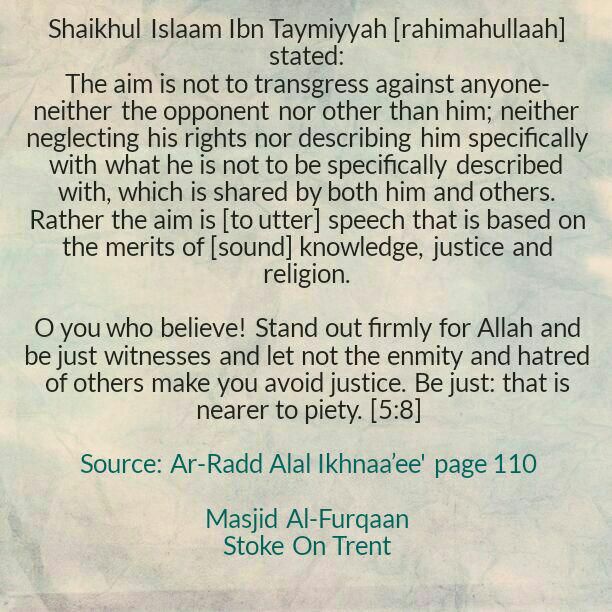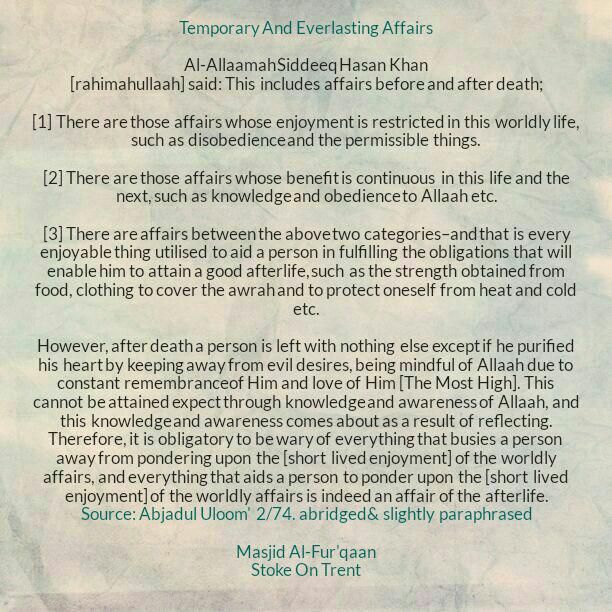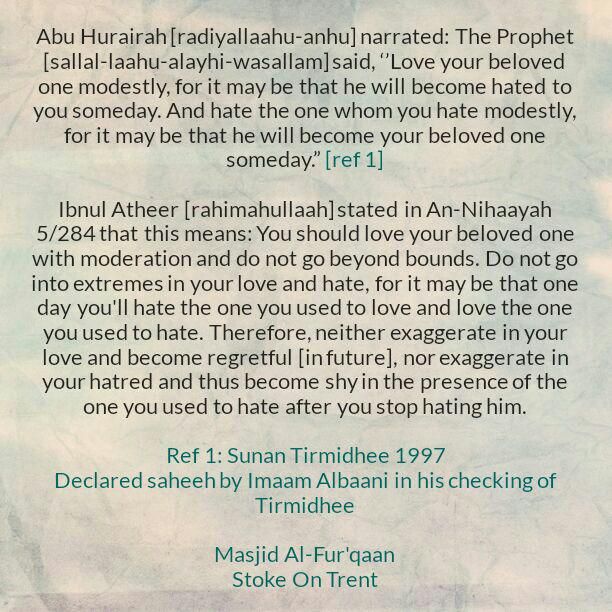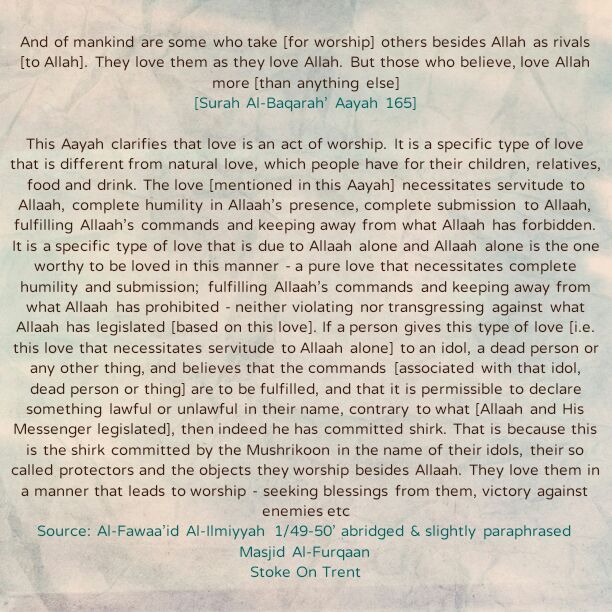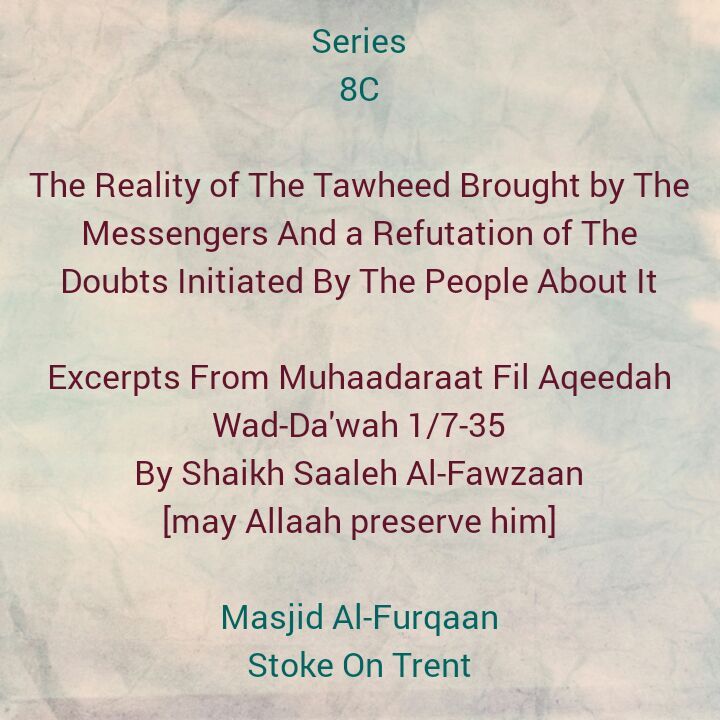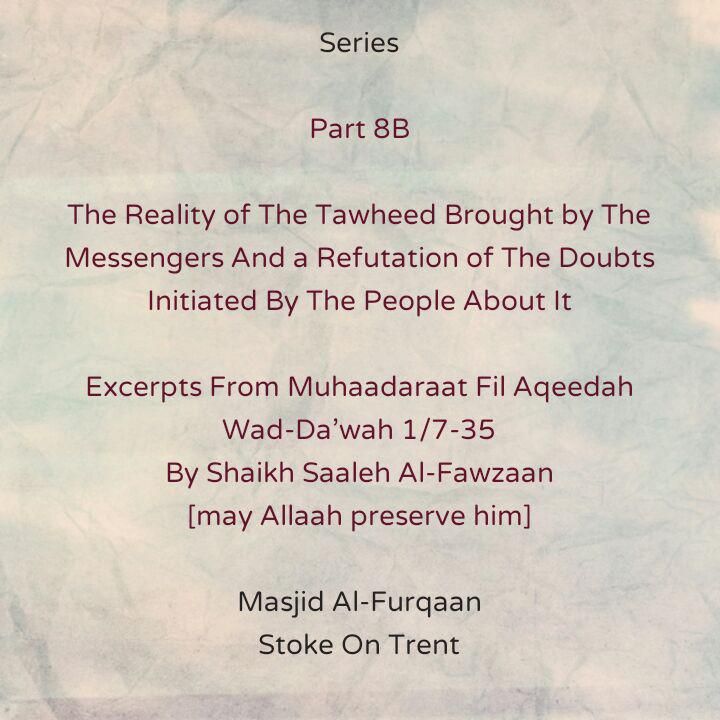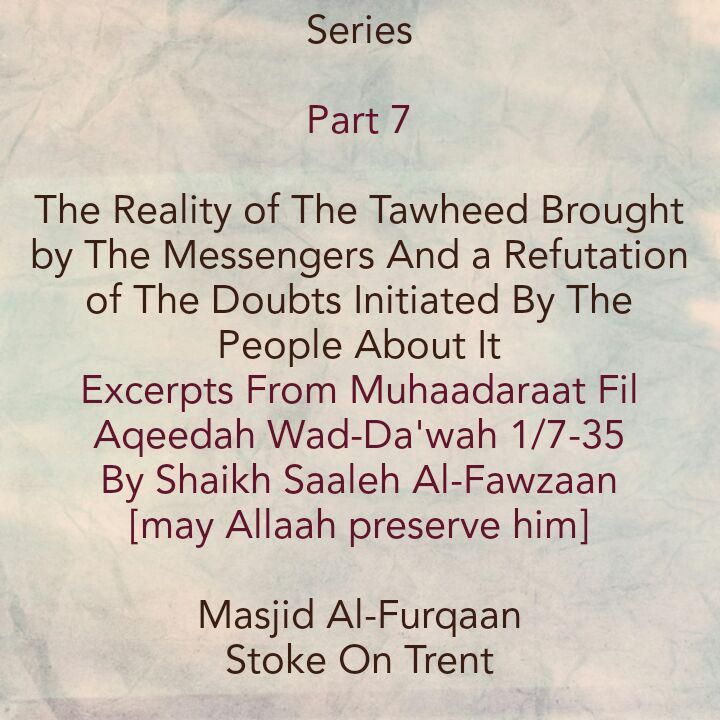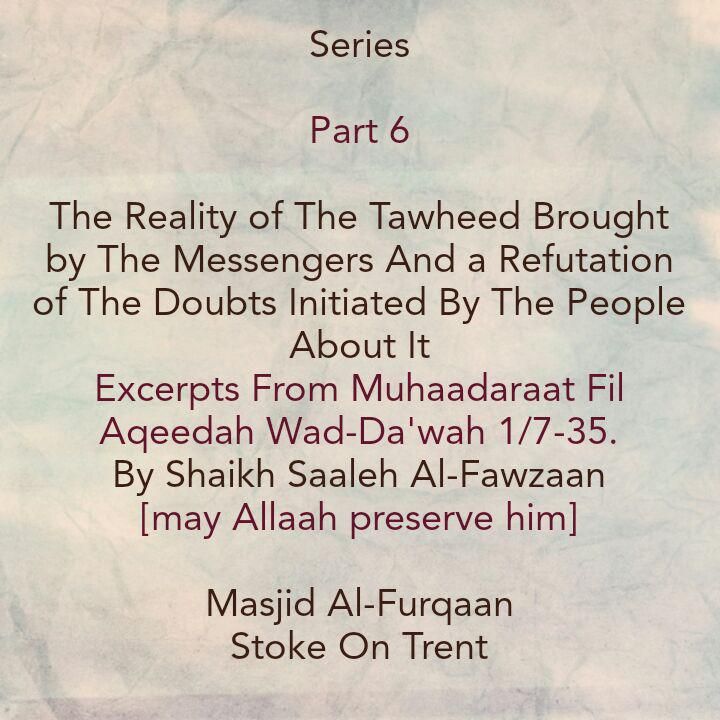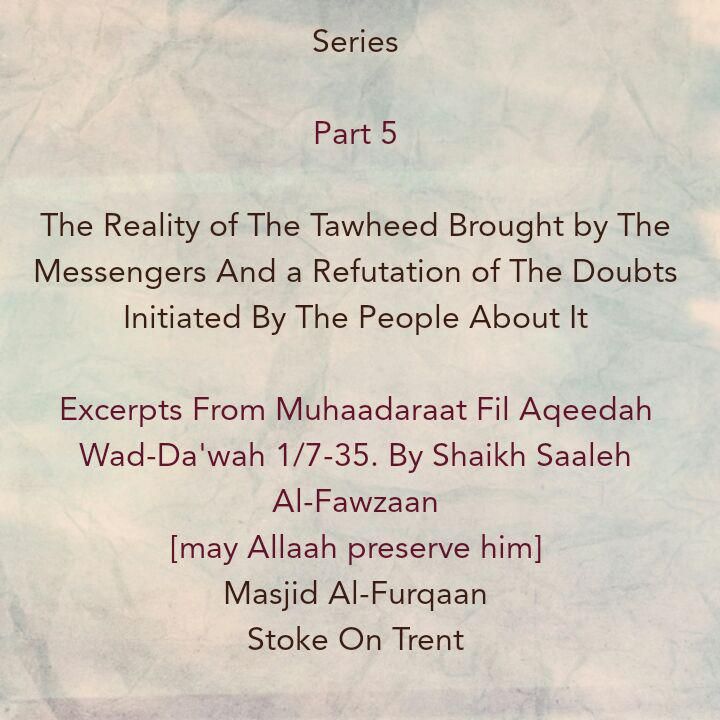In The Name of Allaah, The Most Merciful, The Bestower of Mercy
Shaikh Saaleh Al-Fawzaan [may Allaah preserve him] said:
Indeed, Tawheed is of two types: Tawheed Fil Ma’rifah Wal Ith’baat and it is Tawheed Ar-Ruboobiyyah [ref 1], which includes affirmation that Allaah alone is the Creator, the One in control over the entire affairs of the universe, the giver of life and death, the One who bestows all good and repels harm. The polytheists used to affirm [this category of Tawheed] even though they associated partners with Allaah in worship, just as Allaah [The Most High] stated about them:
قُلۡ مَن يَرۡزُقُكُم مِّنَ ٱلسَّمَآءِ وَٱلۡأَرۡضِ أَمَّن يَمۡلِكُ ٱلسَّمۡعَ وَٱلۡأَبۡصَـٰرَ وَمَن يُخۡرِجُ ٱلۡحَىَّ مِنَ ٱلۡمَيِّتِ وَيُخۡرِجُ ٱلۡمَيِّتَ مِنَ ٱلۡحَىِّ وَمَن يُدَبِّرُ ٱلۡأَمۡرَۚ فَسَيَقُولُونَ ٱللَّهُۚ فَقُلۡ أَفَلَا تَتَّقُونَ
Say (O Muhammad): “Who provides for you from the sky and from the earth? Or who owns hearing and sight? And who brings out the living from the dead and brings out the dead from the living? And who disposes the affairs?” They will say: “Allah.” Say: “Will you not then be afraid of Allah’s Punishment (for setting up rivals in worship with Allah)?” [Surah Yoonus’ Aayah 31]
The likes of these Aayaat are many and in them are clear clarifications that the polytheists used to affirm this category of Tawheed, but they used to wilfully deny the other category- Tawheed Al Ibaadah, which is to single out Allaah in Talab and Qasd [ref 2] in every act of worship, and this necessitates the statement ‘there is no deity worthy of worship except Allaah’.
And because of this, the Prophet [sallal laahu alayhi wasallam] asked the polytheists to testify and believe that there is no deity worthy of worship except Allaah, but [Allaah said that they replied]: [أَجَعَلَ ٱلۡأَلِهَةَ إِلَـٰهً۬ا وَٲحِدًاۖ إِنَّ هَـٰذَا لَشَىۡءٌ عُجَابٌ۬- Has he (i.e. Muhammad-sallal laahu alayhi-wasallam) made the aliha (gods) (all) into One Ilah (God – Allah). Verily, this is a curious thing!” [Surah Saad’ Aayah 5]
[That is] because they knew that whoever says this [i.e. Laa ilaaha Ilal laah], then indeed he has acknowledged that everything worshipped besides Allaah is false and affirmed that only Allaah has the right to be worshipped; because the meaning of Al-Ilaa [i.e. god] is Al-Ma’bood [i.e. an object of worship]. As for worship, it is a comprehensive term for everything that Allaah loves and is pleased with- [including] statements and actions, whether inward [i.e. acts of worship of the heart, such as love, fear, hope etc] or outward [i.e. apparent acts of worship carried out by the limbs].
Therefore, whoever utters this statement Laa Ilaaha illal laah [i.e. there is no deity worthy of worship except Allaah], but then he invokes others besides Allaah, indeed he has contradicted himself. An affirmation of Tawheed Ar-Ruboobiyyah [ i.e. that Allaah alone is the Creator, the One in control over the entire affairs of the universe, the giver of life and death, the One who bestows all good and repels harm] necessitates that a person should also affirm in his heart and by way of his actions that Allaah alone is the deity worthy of worship. And due to this, the Messengers used to command their nations to affirm that Allaah alone is the deity worthy of worship by reminding them about what they have already affirmed regarding Tawheed Ar-Ruboobiyyah, just as Allaah [The Most High] said:
ذَٲلِڪُمُ ٱللَّهُ رَبُّكُمۡۖ لَآ إِلَـٰهَ إِلَّا هُوَۖ خَـٰلِقُ ڪُلِّ شَىۡءٍ۬ فَٱعۡبُدُوهُۚ وَهُوَ عَلَىٰ كُلِّ شَىۡءٍ۬ وَڪِيلٌ۬
Such is Allah, your Lord! La ilaha illa Huwa (none has the right to be worshipped but He), the Creator of all things. So, worship Him (Alone), and He is the Wakil (Trustee, Disposer of affairs, Guardian, etc.) over all things. [Surah Al-An’aam’ Aayah 102]
[Allaah (Th Most High) said]:
وَلَٮِٕن سَأَلۡتَهُم مَّنۡ خَلَقَ ٱلسَّمَـٰوَٲتِ وَٱلۡأَرۡضَ لَيَقُولُنَّ ٱللَّهُۚ قُلۡ أَفَرَءَيۡتُم مَّا تَدۡعُونَ مِن دُونِ ٱللَّهِ إِنۡ أَرَادَنِىَ ٱللَّهُ بِضُرٍّ هَلۡ هُنَّ كَـٰشِفَـٰتُ ضُرِّهِۦۤ أَوۡ أَرَادَنِى بِرَحۡمَةٍ هَلۡ هُنَّ مُمۡسِكَـٰتُ رَحۡمَتِهِۦۚ
And verily, if you ask them: “Who created the heavens and the earth?” Surely, they will say: “Allah (has created them).” Say: “Tell me then, the things that you invoke besides Allah, if Allah intended some harm for me, could they remove His harm, or if He (Allah) intended some mercy for me, could they withhold His Mercy?”
[Surah Az-Zumar’ Aayah 38]
[Source: Muhaadaraat Fil Aqeedah Wad-Da’wah’ pages 11-12. Abridged and slightly paraphrased]
Refs 1 & 2, see article for further detail
http://www.salafipublications.com/sps/sp.cfm?subsecID=MNJ07&articleID=MNJ070003&articlePages=1

